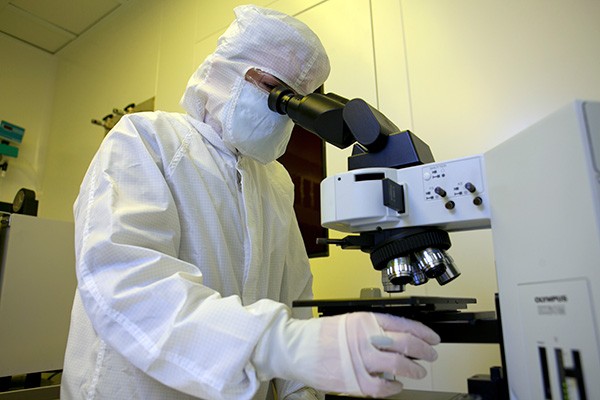Environmental, Health & Safety:
514-848-2424, ext. 4877
Laboratory safety programs

The Laboratory Safety Program was established to ensure academic, research and laboratory activities are conducted in compliance with the provincial and federal laws and regulations within a safe work environment. EHS personnel work in collobaration with researchers, faculty, staff and students to ensure the environmental secure management of chemical, biohazardous and radioactive material. EHS has established policies and procedures detailing safe work and research practices, as well as appropriate safety and environmental controls that must be adhered to.
Enviromental Health & Safety (EHS) conducts laboratory safety inspections throughout the research and teaching laboratories in conjunction with the departmental safety officers. These inspections provide a snapshot of laboratory safety and compliance.
Reports are sent to the Principal Investigator (PI) and provides a list of unsafe or unhealthy conditions identified during the inspection. The PI's and researchers are required to sign the receipt acknowledgement form confirming the inspection findings and return it to EHS.
The PI's and researchers are asked to respond to EHS, in writing, within 30 days of the inspection, to indicate how each item has been corrected or indicating a reason or target date for items that could not be corrected. A follow-up inspection by the EHS team may follow.
EHS remains available to provide the necessary support:
For information on training, classification, packaging, labelling and documentation requirements related to the transportation of hazardous materials, visit the Transportation of Dangerous Goods (TDG) web page.
Concordia University has a licence with the Canada Revenue Agency (CRA) under the Excise Act, 2001 that enables researchers to purchase ethyl alcohol of undenatured grade from Canadian suppliers without having to pay excise duty (approximately 11.69$/litre). This licence dictates mandatory practices concerning storage, usage and disposal.
While these conditions are managed by the Chemical Store at the Loyola campus, research groups located on the SGW campus must show compliance with these mandatory practices. EHS has developed an internal Standard Operating Procedure for the use of non-duty-paid ethyl alcohol of undenatured grade (EHS-SOP-006).
Any Concordia University Principal Investigator (PI), faculty or staff member wishing to purchase ethyl alcohol of undenatured grade for research purposes from an external supplier must contact EHS prior to doing so.
Failure to comply with these requirements could result in the loss of the University’s licence from the CRA, resulting in the requirement to pay the excise tax duty on ethanol of undenatured grade.
Principal Investigators are responsible for their laboratory space from beginning to end. Therefore, they must contact EHS prior to leaving a Concordia University laboratory. EHS will advise and help with the disposal of unwanted chemicals, and the decontamination of equipment so they can be safely transferred or disposed, along with the safe decommissioning of the laboratory. For each equipment, a Certificate of Equipment Decontamination must be filled out and a copy sent to the EHS office.
Leaving experiments unattended should be avoided as much as possible.
If this is unavoidable, the direct Supervisor must be informed and safety measures must be planned according to the following guidelines:
- The Supervisor must be notified and approve the experiment;
- Ensure that all containers and equipment are labeled according to WHMIS regulations;
- Post the “Overnight Unattended Experiment” form (EHS-FORM-079) near the experiment (e.g. on fume hood sash);
- Provide for secondary containment and shielding of the material/experiment in the event of containment failure;
- Keep laboratory door window panes unobstructed.
| Section | Equipment | Laboratory Equipment |
| Autoclaves | Safe Use of Autoclaves | |
| Batteries |
Lead Acid Batteries Safety Guidelines | |
| Lithium Batteries Safety Guidelines | ||
| Biology Safety Cabinets | Biological Safety Cabinet Certification Procedure | |
| Procedure for Safe Use of a Biological Safety Cabinet | ||
| Centrifuges | Safe Use of Centrifuges | |
| Laser | Laser Pointers | |
| Laser Cutters | ||
| Mixing Apparatus | Safe Use of Mixing Apparatus | |
| Vacuum Systems | Protection of vacuum lines, pumps and central systems |
Equipment decontamination
Equipment should be decontaminated appropriately by users PRIOR to any repair, relocation, or disposal of equipment. Appropriate decontamination will ensure that no one is exposed to hazardous products during the handling or transfer of equipment. Principal investigators must complete the Certificate of Equipment Decontamination form for any equipment that would leave their research space (laboratory, studio, workshop, etc.)
Transfer and donations of materials or equipment
All donations of hazardous materials (chemicals, biological materials, research samples, etc.) and donations of research equipment from outside the University are subject to review and approval by Environmental Health and Safety (EHS) prior to collection from the donor and/or before receiving them at the University.
EHS review and approval will ensure that the equipment meets all compliance requirements of applicable regulations and policies of the university, as well as a verification that intended location of the donated hazardous materials and equipment is appropriate and that use of the equipment does not pose a safety risk for the university personnel.
If you are planning on receiving a donation of hazardous materials or research equipment, please contact Environmental Health & Safety by email (ehs@concordia.ca) or at extension 4877.
See the EHS Guideline concerning receiving Hazardous Materials and Research Equipment Donations.







